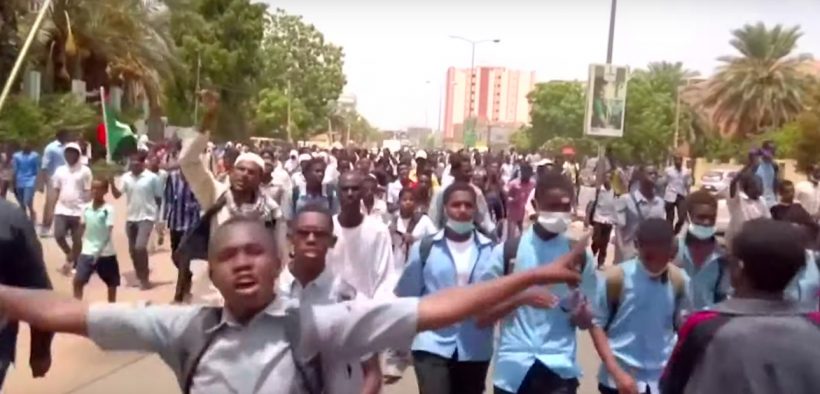Student Deaths, Violence Causes Sudan to Suspend School and Power Sharing Talks

Only weeks after Sudan celebrated the signing of a power-sharing agreement between Sudan’s military and opposition groups, five high schoolers were killed by Sudan’s military while protesting.
Sudanese transitional authorities decided on Tuesday to suspend schooling across Sudan, in the wake of the killing of five high school children on Monday.
Talks between the Transitional Military Council of Sudan and opposition groups have been also suspended. Both sides were slated to meet on Tuesday over the implementation of July 17’s power-sharing agreement.
Violence Again
The developments came in the wake of a fresh round of violence in the northern Sudanese city of El-Obied, after locals including school children took to the streets in protest of the shortage of clean water, electricity and public transport.
Witnesses said that elements of the so-called Rapid Support Forces, which belong to Sudan’s military council, opened fire on the protesters. They added that it was clear that many of the protesters were wearing school uniforms when the military shot dead five high school children and injured a number of others.
At least 5 were killed, including 4 school children & 1 medic, after #Hemeti‘s notorious paramilitary #RSF Janjaweed militia opened fire on a protest in El-Obeid, North Kordofan state, #Sudan‘s ?? opposition-linked doctors’ committee @Sd_Doctors https://t.co/Ksx4NLJwxV
— Saad (@SaadAbedine) July 29, 2019
Sudan’s military council responded to the events by saying that there must be accountability for the shooting, while the United Nations called for an immediate investigation.
The British online newspaper, the Guardian, quoted Rashid Mustafa, a relative of 17-year-old Abdulwahab Abdo who was killed in the protest, as saying that Abdulwahab sustained wounds in both the stomach and kidney before he was ultimately pronounced dead.
While there have been calls for an investigation into the deaths, opposition groups insist, “Only a civilian authority is capable of carrying out independent investigations into all crimes,” as The Forces of Freedom and Change coalition said in a statement.
The capital of Khartoum, plus Omdurman and Port Sudan cities also saw mass protests on Monday after news of the shooting in El-Obied went viral.
UNICEF’s representative in Sudan, Abdullah Fadil, was quoted as saying “No child should be buried in their school uniform. The children aged between 15 and 17 years old, were protesting the commencement of the school year amid political uncertainty in Sudan.”
Fadil called on the Sudanese government to hold a probe into Monday’s killings and bring all those responsible to justice.
Blood Spilled Amid Talks
Monday’s shooting was the bloodiest since last month, when the military reportedly killed about 120 people during a protest in Khartoum, the capital of Sudan. The death toll of 120 is according to non-governmental sources in Sudan including a doctors group, whereas, Sudan’s military counted much smaller number of deaths.
Meanwhile, Al Jazeera reported that Mohammad ‘Hemedti’ Daglo, the deputy-chief of Sudan’s transitional military council and commander of the Rapid Support Forces met with Egyptian President Abdel Fattah al-Sisi during a two-day visit to Egypt.
Recently, the Freedom and Change Party, a key opposition group in Sudan, held meetings with Sudan’s military council over ways to implement the July agreement between Sudan’s military and opposition groups for establishing a power-sharing government. Talks scheduled for Tuesday, were suspended due to the shootings in El-Obied.
Siddiq Yousef, a senior leader of the Sudanese Communist Party, called on opposition forces to halt all negotiations with the government until all human rights violations committed by the military come to an end.
Since last December Sudan has lived through mass demonstrations in protest of the soaring prices of goods and commodities as well as inflation. The protests recently pushed the Sudanese army to overthrow the authoritarian President Omar al-Bashir who had remained in power for more than three decades.
However, the country has been in a state of chaos after the ousting of al-Bashir with no clear successor to lead the country. Sudan’s military assumed power, but June 3 the military opened fire and murdered more than 100 protesters outside the military’s headquarters, intensifying worry that Sudan would become a military dictatorship.











